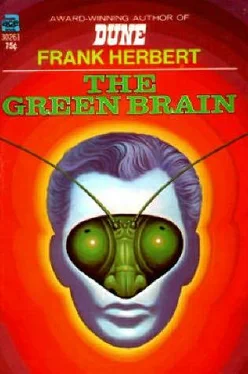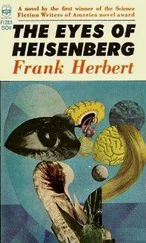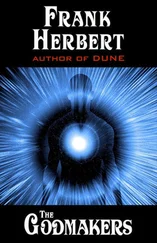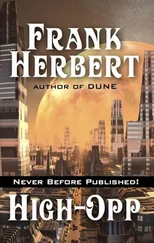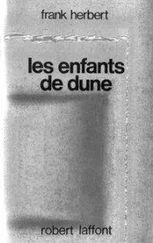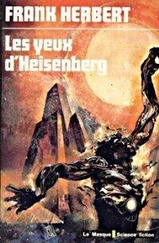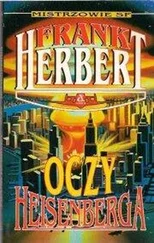“Please, Senhor Martinho,” Hogar said.
Vierho said, “Jefe, perhaps later.”
“Who is there?”
The voice was low, but controlled, and came from a cot at the far end of the tent. Joao made out the form of a human figure stretched on the cot, the white marks of bandages, recognized Chen-Lhu’s face in the half-light.
“It is Joao Martinho,” Joao said.
“Ahh, Johnny,” Chen-Lhu said, and his voice sounded stronger.
Hogar passed Joao, knelt beside the cot, said, “Please, Doctor, do not excite yourself.”
The words held an odd ring of familiarity for Joao, but he couldn’t place the association. He crossed to the cot, looked down at Chen-Lhu. The man’s cheeks were sunken as though after a long famine. His eyes appeared immersed in two black pits.
“Johnny,” Chen-Lhu said, his voice a whisper. “We are rescued, then.”
“We are not rescued,” Joao said. And he wondered why the fool prattled so.
“Ahhh, too bad,” Chen-Lhu said. “Then we’ll all go together, eh?” Chen-Lhu asked. And he thought: What irony! My scapegoat caught in the same trap. What futility!
“There’s still hope,” Hogar said.
Joao saw Vierho cross himself, thought: Silly fool!
“While there’s life, eh?” Chen-Lhu asked. He stared up at Joao. “I’m dying, Johnny, but most of my past eludes me.” And he thought: We’ll all die here. And in my homeland—they’ll all die there, too. Starvation or poison, what’s the difference?
Hogar looked at Joao, said, “Senhor, please go.”
“No,” Chen-Lhu said. “Stay. I’ve things to tell you.”
“You mustn’t tire yourself, sir,” Hogar said.
“What difference?” Chen-Lhu asked. “We’ve marched to the West, eh, Johnny? I wish I could laugh!”
Joao shook his head. His back ached and tingling sensations ran along the skin of both arms. The interior of the tent seemed suddenly brighter.
“Laugh?” Vierho whispered. “Mother of God!”
“You want to know why my government won’t let in your observers?” Chen-Lhu asked. “ Such a joke! The Great Crusade has backfired in my land. The earth goes barren. Nothing helps it—fertilizers, chemicals, nothing .”
Joao experienced difficulty assembling the words into meaningful form. Barren? Barren?
“We face such a famine as history has never seen,” Chen-Lhu rasped.
“Is it the lack of insects?” Vierho whispered.
“Of course!” Chen-Lhu said. “What else has changed? We’ve broken key links in the ecological chain. Of course. We even know what links… now that it’s too late.”
Barren earth , Joao thought. It was a very interesting idea, but his head felt too hot to explore the thought.
Vierho, dismayed by Joao’s silence, bent over Chen-Lhu, said, “Why don’t your people admit this thing and warn the rest of us before it’s too late?”
“Don’t be a fool! ” Chen-Lhu said, and there was some of the old, harsh command in his voice. “We’d lose all before we’d lose that much face. I tell it here now because I’m dying and because none of you will survive me for long.”
Hogar stood up and stepped back from the cot as though fearful of contamination.
“We need a scapegoat, you see?” Chen-Lhu said. “That’s why I was sent here—to find a scapegoat. We’re fighting for more than our lives.”
“You could always blame the North Americans,” Hogar said, his tone bitter.
“I fear we’ve worn that one out, even with our people,” Chen-Lhu said. “We did the thing ourselves, you see? There’s no escaping that. No… all we could hope for was to find here a way of blaming someone else. The British and French provided some of our poisons. We explored that with no success. Some Russian teams helped us… but the Russians haven’t realigned their entire country—only to the Ural Line. They could show the same problems as we have and… you see? They’d make us appear foolish.”
“Why haven’t the Russians said anything?” Hogar asked.
Joao looked at Hogar, thinking: Senseless words, senseless words .
“The Russians are quietly rolling back their Ural line into the Green,” Chen-Lhu said. “Reinfesting, you see? No… my last orders were to find a new insect, typically Brazilian, that would destroy many of our crops… and for whose presence we could blame… who? Perhaps some bandeirantes.”
Blame bandeirantes , Joao thought. Yes, everyone is blaming the bandeirantes .
“The really amusing thing,” Chen-Lhu said, “is what I see in your Green. Do you know what I see?”
“You’re a devil!” Vierho grated.
“No, just a patriot,” Chen-Lhu said. “Are you not curious as to what I see in your Green?”
“Speak and be damned!” Vierho said.
That’s telling him , Joao thought.
“I see the signs in your Green of the same blight that has struck my poor nation,” Chen-Lhu said. “Smaller fruit, smaller crops—smaller leaves, paler plants. It’s slow at first, but everyone will see it soon.”
“Then maybe they’ll stop before it’s too late,” Vierho said.
That’s foolishness , Joao thought. Who ever stops before it’s too late?
“Such a simple fellow you are,” Chen-Lhu said. “Your rulers are the same as mine: they see nothing but their own survival. They will see nothing else until it’s too late. This is always the way with governments.”
Joao wondered why the tent was growing so dark after being so bright. He felt hot and his head whirled as though he’d had too much alcohol. A hand touched his shoulder. He looked down at it, followed the hand up to an arm… a face: Rhin. There were tears in her eyes.
“Joao… Senhor Martinho, I’ve been such a fool,” she said.
“You heard?” Chen-Lhu asked.
“I heard,” she said.
“A pity,” Chen-Lhu said. “I’d hoped to preserve some of your illusions… for a little while, anyway.”
What an odd conversation , Joao thought. What an odd person, this Rhin. What an odd place, this tent with its ridgepole coming around to face me .
Something thudded against his back and his head.
I’ve fallen , he thought. Isn’t that odd?
The last thing he heard before unconsciousness flooded his mind with black ink was Vierho’s startled voice:
“Jefe!”
There was a dream in which Rhin hovered over him saying, “What difference does it make who gives the orders?” And in the dream, he could only turn a baleful stare on her and think how hateful she looked—in spite of her beauty.
Someone said, “What’s the difference? We’ll all be dead soon anyway.”
And another voice said, “Look, there’s a new one. That one looks like Gabriel Martinho, the Prefect.”
Joao felt himself sinking into a void where his face was held by clamps that forced him to stare into the monitor screen on the dash of his airtruck’s pod. The screen showed a giant stag beetle with the face of his father. And the sound was a cicada hum up and down the scale with a voice inside the hum: “Don’t excite yourself. Don’t excite yourself…”
He awoke screaming to realize there was no sound in his throat—only the memory of screams. His body was bathed in perspiration. Rhin sat beside him wiping his forehead. She looked pale and thin, her eyes sunken. For a moment he wondered if this emaciated Rhin Kelly were part of a dream; she seemed to give no notice to the fact that his eyes were open although she looked right at him.
He tried to speak, but his throat was too dry. The movement attracted Rhin, though. She bent over him, peered into his eyes. Presently she reached behind her, brought up a canteen, trickled a few drops of water down his throat.
Читать дальше
